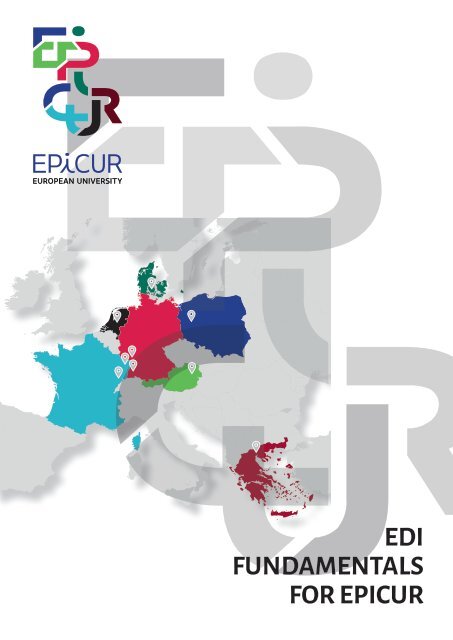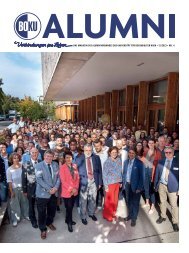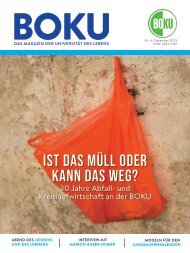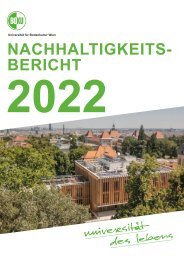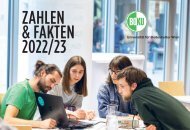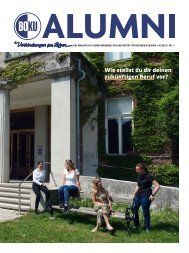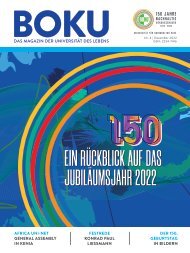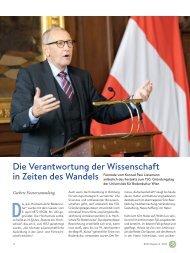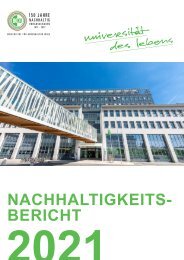EPICUR EDI Fundamentals
Create successful ePaper yourself
Turn your PDF publications into a flip-book with our unique Google optimized e-Paper software.
<strong>EDI</strong><br />
FUNDAMENTALS<br />
FOR <strong>EPICUR</strong>
Table of Contents<br />
1. Introduction - Vision 2030<br />
2. Objectives : Joint statement by the <strong>EDI</strong> Working Group<br />
3. <strong>EPICUR</strong> Definitions - explanation / aim<br />
3.1. E is for Equity<br />
3.2. D is for Diversity<br />
3.3. I is for Inclusion<br />
4. Key <strong>EPICUR</strong> <strong>EDI</strong> <strong>Fundamentals</strong><br />
4.1. Open mindedness and flexibility<br />
4.2. Inclusive governance<br />
4.3. Inclusive infrastructure<br />
4.4. Commitment and Collective Engagement<br />
4.5. Monitoring<br />
4.6. Accountability<br />
4.7. Dissemination<br />
5. Final agreement/signing of the agreement/commitment<br />
6. ANNEX<br />
6.1. Multilingual Glossary<br />
6.2. <strong>EDI</strong> Contact persons / bodies at each <strong>EPICUR</strong> member university<br />
3<br />
4<br />
5<br />
5<br />
5<br />
6<br />
7<br />
8<br />
8<br />
9<br />
9<br />
10<br />
10<br />
11<br />
12<br />
13<br />
13<br />
13<br />
Page 2<br />
<strong>EDI</strong> FUNDAMENTALS FOR <strong>EPICUR</strong>
1. Introduction<br />
Equity, Diversity and Inclusion (<strong>EDI</strong>) are key for a just, healthy and united society.<br />
Located in campuses across Europe, <strong>EPICUR</strong> universities rely on a set of shared core values which cut across<br />
their missions: European values, Academic freedom, Sustainable transformation, equity, diversity and inclusion<br />
throughout all aspects of life, that shape how <strong>EPICUR</strong> develops our European teaching and learning as well as<br />
research.<br />
<strong>EPICUR</strong>’s vision is to educate and train students and staff to build a society, united in the mission to sustainably<br />
applying the principles of equity, diversity and inclusion in all aspects of academic life.<br />
This focus on <strong>EDI</strong> is in line with the Rome Ministerial Communiqué of 2020 and the European Commission’s<br />
policies and strategies, such as:<br />
• a gender equality strategy<br />
• an antiracism action plan<br />
• a Roma strategic framework<br />
• a strategy for the rights of LGBTIQ persons<br />
• a strategy for the rights of persons with disabilities<br />
• COUNCIL RECOMMENDATION on building bridges for effective European higher education cooperation<br />
In particular, the EU strategy for universities, in chapter 4.2., defines the goal “Foster diversity, inclusiveness and<br />
gender equality” – the present document therefore has to be seen as a contribution to the European framework<br />
for diversity and inclusion, including on gender gaps, identifying challenges and solutions for universities. This<br />
document can also be used as complementary document to the institutional gender equality plans (GEP).<br />
With the establishment of a concept of <strong>EDI</strong> fundamentals for <strong>EPICUR</strong> and the ”toolkit for an action plan” within<br />
<strong>EPICUR</strong> (related to <strong>EPICUR</strong> activities), each university can select the activities and tools that are suitable for this<br />
institution, according to their own <strong>EDI</strong>-related strategies and -policies already in place as well as regulations<br />
of networks or projects they are already involved in. These documents thus shouldn’t be considered as something<br />
contradictory to these existing strategies or additional aspects that have to be implemented, but rather<br />
as stepstones to build upon, contributing to the further development of an inclusive, respectful and safe space<br />
for students, researchers and staff. Nevertheless, by adopting the concept of <strong>EDI</strong> fundamentals, <strong>EPICUR</strong> will not<br />
only follow the EU recommendations concerning this topic but also share best practices within the consortium<br />
to learn from each others’ experiences and identify gaps which have not been addressed yet. <strong>EPICUR</strong> will hence<br />
set an example as a European University Alliance to foster equitable and inclusive pathways in all aspects of the<br />
alliance’s work and beyond through holistic and intersectional approaches. Through raising awareness for the<br />
importance of diversity and inclusion in our education and workplaces, our intention is that all kinds of discrimination<br />
will be acknowledged and addressed and, in the long term, these procedures shall ensure that discrimination<br />
has no place in <strong>EPICUR</strong>. All of the <strong>EDI</strong> principles will be included in our innovative teaching methods and<br />
hereby setting an example for the future teaching and learning environments. By implementing and living <strong>EDI</strong><br />
standards, <strong>EPICUR</strong> will become a role model for safe and discrimination-free workplaces and will be known for<br />
an inclusive, diverse and equitable European university. The respectful and appreciative atmosphere will allow<br />
students and staff to acquire interpersonal skills and will make them more resilient.<br />
Page 3<br />
<strong>EDI</strong> FUNDAMENTALS FOR <strong>EPICUR</strong>
2. Objectives: Joint statement<br />
by the <strong>EDI</strong> Working Group<br />
The <strong>EPICUR</strong> alliance has a strong and clear commitment to Equity, Diversity and Inclusion (<strong>EDI</strong>) and has a clear<br />
vision of how an <strong>EDI</strong> impacted educational environment should look. <strong>EDI</strong> is implemented through all aspects<br />
of life, framed around the idea of “widening access to <strong>EPICUR</strong>’s education offer … for a successful learning experience<br />
for all”. <strong>EDI</strong> should be included at the heart of each university’s strategy, policies and governance. Equity,<br />
diversity and inclusion should be embedded in the <strong>EPICUR</strong> members’ human resources policies and student<br />
recruitments, as well as the careers developments and supports for students’ employability. In addition to this,<br />
it should be reinforced that <strong>EDI</strong> values trickle down into educational and professional contexts to the extent<br />
that staff and students alike are incorporating this actively in their way of interactions. An inclusive environment<br />
should also be provided to staff, academics and students with support services, accessible campus environments<br />
and open institutions. Diversity should be promoted and everyone has a right to equality of opportunity and to<br />
a good and harmonious working environment and atmosphere. <strong>EPICUR</strong> aims to create a culture that promotes<br />
respect and dignity in all relationships, enable its member universities in the creation and elaboration of instruments,<br />
policies and processes to measure and promote <strong>EDI</strong>, to prevent against discrimination in any form:<br />
be that on the basis of “gender” 1 , age, race”/ethnic origin, sexual orientation, ability, mental health, religion or<br />
belief. We believe that looking at all of these factors and more requires an intersectional approach to fighting<br />
against discrimination and recognising privilege.<br />
Complaints and related situations are to be handled seriously in relevant structures and victims supported. Proactively,<br />
information should be displayed and awareness raised to all staff, academics and students.<br />
It is also extremely important to note and acknowledge that there are within the <strong>EPICUR</strong> consortium, differing<br />
national positioning, legislation and institutional policies on <strong>EDI</strong> and the concepts therein which affect a common<br />
definition and the same level or degree of application. These are absolutely to be considered when thinking<br />
of ‘one common’ approach, which won’t be feasible within <strong>EPICUR</strong>. Nevertheless, the common denominator<br />
will and must be that discrimination and injustice are considered by all members of this consortium as elements<br />
of our society we wish to address and diminish. We do not rely on concepts to hold us back from understanding<br />
basic human rights standards and application of these for the betterment of everyone. We acknowledge the existence<br />
of privilege, of intersectional axes and varying levels of discrimination for marginalised, vulnerable, underserved<br />
individuals and communities whose needs are valid – for example we do not advocate ‘colour blindness’<br />
in questions of ‘Race’ and we address “difference” in the sense of who is treated equally and who is not.<br />
1<br />
terms in “” refer to constructed notions of terms which are to this day questioned but which make it easier to refer to a specific attribute or<br />
characteristic, even if we do not acknowledge their existence as such beyond their construction.<br />
Page 4<br />
<strong>EDI</strong> FUNDAMENTALS FOR <strong>EPICUR</strong>
3. <strong>EPICUR</strong> Definitions -<br />
explanation / aim<br />
To develop the Concept of <strong>EDI</strong> fundamentals and this Toolkit for an Action plan, the <strong>EDI</strong> experts of the <strong>EPICUR</strong><br />
<strong>EDI</strong> Working group used the following definitions of Equity, Diversity and Inclusion, which were developed in<br />
joint meetings on the basis of existing terminology and relevant theories.<br />
3.1. E is for Equity<br />
How does equity differentiate from equality? As <strong>EPICUR</strong> sees it, not all people are treated, understood, perceived,<br />
supported and acknowledged or recognised equally. In a world full of preconceptions and discriminatory<br />
practices on various intersectional (the intersections of ethnicity, class, gender, age, ability (physical and mental),<br />
religion, ‘gender’, (a)sexual preference/orientation and much more) axes, we must consider that equity is<br />
a key criterion for understanding how to rectify that imbalance. <strong>EPICUR</strong> is committed to EQUITY, and therefore<br />
defines it specifically for our consortium and area of work, as a key principle for understanding that imbalance<br />
has to be addressed by equity. By definition it differs from equality in that ‘everyone is given the same’ rather<br />
equity says “some need more than others” for equality to be reached, truly, fairly and sustainably.<br />
When we talk of equity, we talk of listening to marginalised and underrepresented groups and addressing their<br />
specific concerns and needs with integrity and sensitivity, we talk of empowering those groups to be in a position<br />
of defining deciding for themselves what their needs, desires and aims are and finally we talk of including<br />
diverse groups in processes which aim to achieve equity.<br />
3.2. D is for Diversity<br />
Diversity has long been a topic within various kinds of institutions<br />
with differing intentions and goals. Within <strong>EPICUR</strong>, diversity is appreciated<br />
and considered as normal, since it is a reflection of our<br />
world and society and a natural occurring phenomenon from biodiversity<br />
to ideas of gender spectrums. When we refer to Diversity,<br />
we concretely mean the act of recognising differences of whatever<br />
aspect, discrimination and discriminatory practices, hiring methods,<br />
teaching curricula which do not include, address, acknowledge<br />
and accept a broad, diverse cross-section of our society. Following<br />
the concept of diversity, we aim at not creating labels and categories<br />
which lead to reproduce discriminatory practices but talk with<br />
diverse groups in order to include them in diversification processes.<br />
Page 5<br />
<strong>EDI</strong> FUNDAMENTALS FOR <strong>EPICUR</strong>
In the context of educational institutions, we talk of diversity on 3 key levels:<br />
Personnel and students – for example (non-exhaustive list): how diverse the staff are: how the institution goes<br />
about hiring and including diverse staff in long term, well-paid, decision-making positions as well as with expertise<br />
on diverse parts of society; how accessible the workplace is to include diverse persons; how sensitive the<br />
institution to cultural diversity, how represented marginalised groups (i.e., hiring in ways which do not produce<br />
tokenism) are.<br />
Programming – for example (non-exhaustive list): how the curriculum reflects different parts and people from<br />
all over the world and includes all kinds of people and their ways of life; how do the institutions address forms<br />
of knowledge which are non-Eurocentric and which are not only scientific/technical/formally academic, i.e how<br />
programming makes way for alternative forms of teaching, learning and ideas of knowledge.<br />
Public – for example (non-exhaustive list): how the institution considers and includes its prospective public/<br />
audience, if there are ways for them to engage with the institution and how they can offer insight and feedback<br />
as well as thinking of ways the public (perhaps locally but also internationally) can benefit from the institution.<br />
Within those three areas we consider diversity to be a key foundation of our work and considerations as we strive<br />
towards a more diverse <strong>EPICUR</strong> via the diversity of its members.<br />
3.3. I is for Inclusion<br />
Inclusion is for <strong>EPICUR</strong> a process of increasing the participation of all people, students<br />
and staff, in education, work, and reducing their potential exclusion from higher education.<br />
The inclusive approach therefore goes beyond the question of access to education<br />
and working environment but (also) takes into account the differences of all people on a<br />
daily-basis during the educational process. Differences are based on ethnics, linguistics,<br />
cultural or religious background, gender, disability or particular abilities...<br />
These differences define diversity and should be taken into account to allow <strong>EPICUR</strong> to<br />
better meet the needs of everyone. Diversity is therefore a great asset, but also a great<br />
challenge: that of inclusion.<br />
Inclusive education is based on the principle of equity, which means giving everyone the resources they need<br />
to success.<br />
Adopting an inclusive approach means guaranteeing an education and working environment free of discriminatory<br />
behaviours or practices, allowing the expression of diversity and taking advantage of its richness.<br />
It means giving students and staff access to all the educational codes and expectations, adapting the studying<br />
and working environment for people with disability, removing barriers to learning (i.e. giving access to disciplinary<br />
English lexicon), favouring interactions between people of different educational and cultural backgrounds,<br />
questioning teaching and evaluation practices.<br />
For staff, it also means to address unconscious bias, questioning managerial practices and supporting underrepresented<br />
groups.<br />
Taking inclusion into consideration benefits to everyone.<br />
Page 6<br />
<strong>EDI</strong> FUNDAMENTALS FOR <strong>EPICUR</strong>
4. Key <strong>EPICUR</strong> <strong>EDI</strong> <strong>Fundamentals</strong>:<br />
4.1. Open mindedness and flexibility<br />
Open mindedness is an attitude related to the tendency to accept new ideas and to be willing to review social,<br />
political and religious values. According to Tjosvold & Poon (1998), open-mindedness norms relate to the way<br />
in which people approach the views and knowledge of others, accept the others, and „incorporate the belief<br />
that others should be free to express their views and that the value of others’ knowledge should be recognized.“ 2<br />
Open mindedness is considered an important factor for constructing effective intercultural and diverse teams.<br />
In <strong>EPICUR</strong>, we accept the above definition of open mindedness and consider this trait as an important element<br />
to be cultivated within our context. Being open-minded means encouraging people to feel free to express their<br />
views without being afraid of others’ criticism or undervalue. We value highly the expression of new ideas and<br />
knowledge and try to create an open atmosphere where different ideas and views would be exchanged.<br />
In this open-minded intercultural environment, people with diverse background (students, professors or staff<br />
member) will be able to express themselves, without harming others and will work together collaboratively.<br />
Different approaches, attitudes and background are considered as positive elements that foster collaboration<br />
leading to novel solutions.<br />
Being open-minded means also accepting all individuals no matter their physical or mental health. We value<br />
the uniqueness and worth of all people, ensuring that people who face difficulties or disabilities will be included<br />
and well-integrated in <strong>EPICUR</strong> environment. People with disabilities will find in <strong>EPICUR</strong> an open place to foster<br />
and grow academically or professionally and their critical point of view will be heard and considered for designing<br />
and implementing actions.<br />
We see multilingualism as an opportunity for personal growth and active humanism, therefore, e.g. in <strong>EPICUR</strong><br />
meetings an approach towards pragmatic language use (by making use of passive language knowledge) is<br />
made – in line with the <strong>EPICUR</strong> Model Language Policy (https://epicur.education/epicur-european-model-language-policy/<br />
).<br />
2<br />
Tjosvold, D, Poon, M. (1998). „Dealing with scarce resources: openminded interaction for resolving budget conflicts“, Group and organization<br />
management, Vol.23, No.3, pp237-58. as cited in Mitchell, R. and Nicholas, S. (2006). Knowledge Creation in Groups: The Value of<br />
Cognitive Diversity, Transactive Memory and Open-mindedness Norms. Electronic Journal of Knowledge Management, Vol 4 (1) pg 67-74.<br />
Page 7<br />
<strong>EDI</strong> FUNDAMENTALS FOR <strong>EPICUR</strong>
Another element that we considered important is flexibility; the ability to be easily modified and the willingness<br />
to change or compromise in order to face challenges. According to the European Observatory of Working<br />
Life (EurWork) , “although flexibility is used frequently in the context of the employment and industrial relations,<br />
its meaning is contested”. Flexibility has three dimensions and therefore similar definitions. It refers as<br />
1) the employer’s desire for variable labour inputs or changing tasks in order to increase productivity, 2) the<br />
employees’ desire for variable contractual arrangements in working conditions or working time in order to reconcile<br />
changing private and domestic needs and achieve a better work-life balance and 3) the EU policy that<br />
responses to ‘labour market rigidities”. In <strong>EPICUR</strong>, we accept this multi-dimensional definition as flexibility has<br />
the meaning of offering flexible working conditions (pg working hours, mobile working, schedule etc.) for all<br />
employees (teaching or administrative staff) and especially staff members with disabilities or care givers, in<br />
order to reconcile well their working and family obligations.<br />
Furthermore, <strong>EPICUR</strong> member universities promote flexibility also for students. Working and studying in a decentralized<br />
scheme has been applied already (pg the program of studies, the teaching methods or the pace of<br />
studying is flexible). In the next years, flexibility will be offered for example to students facing mobility problems<br />
or students with disabilities, by offering innovative (short-term or virtual) exchange formats or adapting<br />
the methods of examinations or evaluation.<br />
In this context flexibility also means that every <strong>EPICUR</strong> member is able to follow its own and its networks’ <strong>EDI</strong><br />
strategies and can take the fundamental document and the <strong>EDI</strong> toolkit as resources for further development.<br />
In this way, the <strong>EPICUR</strong> University will be a prosperous working environment for all but also a living organization<br />
that accepts and faces challenges.<br />
4.2. Inclusive governance<br />
Inclusive governance denotes the means by which an organisation steers its collective concerns including everyone<br />
who has stake in its issues. <strong>EPICUR</strong> commits to creating structures and policies across the <strong>EPICUR</strong> Alliance<br />
that make these processes as inclusive as possible.<br />
• Policies and structures which reflect and foster the partner institutions’ diversity in such a manner are:<br />
• Increasing the representation of all relevant stakeholders (e.g. students, staff, etc.) at every level of <strong>EPICUR</strong><br />
decision-making processes and governance<br />
• Ensuring each <strong>EPICUR</strong> partner institution is equipped to prioritise <strong>EDI</strong>, anti-discrimination- and<br />
gender-equality-related issues taking into account diverse factors of background and circumstance<br />
• Supporting the development of inclusive procedures that take into account different cultural and social<br />
backgrounds in <strong>EPICUR</strong> partner organizations<br />
• Enhancing the transparency of decision-making through appropriate and open communication<br />
Page 8<br />
<strong>EDI</strong> FUNDAMENTALS FOR <strong>EPICUR</strong>
Any governance should strengthen the values on which <strong>EPICUR</strong> is based (see page 2 of this document), including<br />
social cohesion, democratic societies, diversity and inclusion. The proven principle of subsidiarity (the smallest<br />
competent unit can make a decision) should be applied as often as possible.<br />
4.3. Inclusive infrastructure<br />
Inclusive infrastructure is a basic requirement for all students and<br />
staff to be able to engage and participate in <strong>EPICUR</strong> without barriers.<br />
It covers the following three areas: physical, information technology<br />
and personnel infrastructure – these areas have to be taken care of at<br />
each <strong>EPICUR</strong> member university.<br />
In the physical world, this means that transportation, pathways, and<br />
buildings on campus are accessible. This includes access to food, administration,<br />
teaching and learning spaces e.g. by providing accessible<br />
tables, ramps, toilets, elevators for wheelchair users, sockets for<br />
assistive technologies and guiding systems for people with visual impairments.<br />
Moreover, information technology (IT) infrastructure - hardware, software, and virtual offerings - are a core part<br />
of <strong>EPICUR</strong>‘s ability to participate in its offerings. It is therefore essential that these offerings are accessible from<br />
the start.<br />
The third part of an inclusive infrastructure is accessible services that support students and staff with disabilities<br />
and chronic illnesses, also considering the intersections of ethnic and social background or whether they have<br />
dependents. These considerations must also include the staff recruited for counselling and assistance.<br />
4.4. Commitment and Collective Engagement<br />
All <strong>EPICUR</strong> member universities are committed to safeguarding the <strong>EDI</strong> <strong>Fundamentals</strong><br />
as laid down in this document and implement – in accordance with their own<br />
<strong>EDI</strong> strategies and current status of <strong>EDI</strong> implementation at their institutions - the<br />
most suitable examples listed in the “Toolkit for an Action Plan” All <strong>EPICUR</strong> member<br />
universities will monitor that <strong>EDI</strong> is taken into account in the development of<br />
<strong>EPICUR</strong> policies, processes and infrastructure.<br />
The new inclusive governance model of <strong>EPICUR</strong> will guarantee the high relevance of<br />
<strong>EDI</strong>, which is part of the duties of the <strong>EPICUR</strong> Ombudsperson committee.<br />
Page 9<br />
<strong>EDI</strong> FUNDAMENTALS FOR <strong>EPICUR</strong>
4.5. Monitoring<br />
Monitoring of <strong>EDI</strong> activities has to take place at the level of each <strong>EPICUR</strong> member<br />
university; however, it is the duty of the <strong>EPICUR</strong> governing bodies, supported<br />
by the Ombudspersons committee, to make sure that <strong>EDI</strong> is included in the<br />
development of <strong>EPICUR</strong> policies, processes and infrastructure.<br />
The “toolkit for an Action plan” suggests Key Performance Indicators which can<br />
be used for this purpose.<br />
4.6. Accountability<br />
All <strong>EPICUR</strong> staff members and students have to apply and respect the values on Equity,<br />
Diversity and Inclusion and adhere to the fundamentals as described in this document.<br />
Contradictory behaviour is not accepted within <strong>EPICUR</strong>, independent of the<br />
position of the person showing this behaviour.<br />
In order to safeguard the implementation of the <strong>EDI</strong> principles, the following procedures<br />
are agreed upon and further defined in the Action plan:<br />
• For exchange students, the home and host university define a procedure to deal<br />
with misbehaviour<br />
• Staff misbehaviour is dealt with by the home university<br />
• In order to solve issues between home university rules and <strong>EPICUR</strong> <strong>EDI</strong> principles,<br />
the <strong>EPICUR</strong> ombuds persons are nominated to mediate such cases. The <strong>EPICUR</strong><br />
Ombuds persons will report cases which can’t be solved within this committee to<br />
the <strong>EPICUR</strong> governing bodies.<br />
In short, issues between home university rules and <strong>EPICUR</strong> fundamentals should<br />
be dealt with by each university’s local ombuds persons. In case they cannot find a<br />
solution, the case should be put forward to the committee of all 9 universities’ Ombudspersons.<br />
Matters that are beyond the competences of the committee of ombuds<br />
persons (e.g., financial resources, structural decisions, application procedures) will be<br />
brought forward to the Governing Body of <strong>EPICUR</strong>.<br />
An overview of <strong>EDI</strong> contact persons can be found in Annex 5.2.<br />
Page 10<br />
<strong>EDI</strong> FUNDAMENTALS FOR <strong>EPICUR</strong>
4.7. Dissemination<br />
Dissemination of <strong>EDI</strong> activities and principles are considered essential for the <strong>EPICUR</strong>’s long-term impact and<br />
the benefits it may bring to academics, industry, and the general public. We define dissemination as the public<br />
disclosure of the <strong>EDI</strong> principles, good practices, and events promoting equity, diversity, and inclusion.<br />
To this end, the relevant information on <strong>EDI</strong> fundamentals, initiatives, and events and similar measures described<br />
in the toolkit and organized by <strong>EPICUR</strong> and/or members of the alliance will be available on various EPI-<br />
CUR communication channels, i.e., the <strong>EPICUR</strong> website and social media platforms. Periodical communications<br />
with update and important information in the area of <strong>EDI</strong> will also be distributed via the <strong>EPICUR</strong> newsletter.<br />
Importantly, we aim to develop sensitization materials to spread the <strong>EDI</strong> fundamentals, which will be fully available<br />
to other institutions. Furthermore, knowledge developed as a result of <strong>EDI</strong>-focused activities will be shared<br />
with internal and external stakeholders by, for instance, organizing open lectures, trainings, and workshops so<br />
as to further promote the relevance of <strong>EDI</strong> principles. Those events will be organized for both internal target<br />
groups (e.g., students and staff members of partner universities) and external groups, thus fostering the social<br />
responsibility of the Alliance. All Dissemination activities will be made in an accessible format.<br />
Page 11<br />
<strong>EDI</strong> FUNDAMENTALS FOR <strong>EPICUR</strong>
5. Final agreement/signing of<br />
the agreement/commitment<br />
For UNISTRA:<br />
For UHA:<br />
For ALU-FR:<br />
For KIT:<br />
For AUTH:<br />
For AMU:<br />
For BOKU:<br />
For UvA:<br />
For SDU:<br />
Président Michel Deneken<br />
Président, Pierre-Alain Muller<br />
Vice-President for University Culture, University of Freiburg, Prof. Dr. Sylvia Paletschek<br />
Vice President for Transfer and International Affairs Professor Dr. Thomas Hirth<br />
Vice Rector for Academic & Student Affairs, Professor Dimitrios Koveos<br />
Rector, Prof. Bogumila Kaniewska<br />
Rector, Univ.Prof. MMag. Dr. Eva Schulev-Steindl, LL.M.<br />
Executive Board chair, Geert ten Dam<br />
Rector, Jens Ringmose<br />
Page 12<br />
<strong>EDI</strong> FUNDAMENTALS FOR <strong>EPICUR</strong>
6. ANNEX<br />
6.1. Multilingual Glossary<br />
Français<br />
Hollandsk<br />
Polski<br />
English<br />
Deutsch<br />
Ελληνικά<br />
The ALU-FR „Diversity Glossary“ https://www.diversity.uni-freiburg.de/diversity-in-teaching/DiversityGlossary.<br />
pdf (translated in all languages used within <strong>EPICUR</strong>; i.e. English, French, German, Greek, Polish, Dutch; including<br />
definitions of terms such as diversity, inclusion and equality/social justice and many more which we think<br />
will be useful to the project and subject matters dealt with therein)<br />
6.2. <strong>EDI</strong> Contact persons / bodies at each<br />
<strong>EPICUR</strong> member university:<br />
• ALU-FR:<br />
Dr. Regina Herzog (gleichstellungsbeauftragte@uni-freiburg.de)<br />
Felix Wittenzellner (Felix.Wittenzellner@zv.uni-freiburg.de)<br />
• AMU:<br />
Prof. Robert Kmieciak, Rector‘s Representative for Equal Treatment: robert.kmieciak@amu.edu.pl<br />
• AUTH:<br />
Professor Emerita Theofano Papazisi, Students’ Ombudsperson at AUTH theopapa@law.auth.gr<br />
Professor Dimitrios S. Koveos, Vice Rector for Academic & Student Affairs - President of the Committee of<br />
Ethics, Aristotle University of Thessaloniki (vice-rector-ac@auth.gr)<br />
• BOKU:<br />
Coordination Office for Gender Equality, Diversity and Accessibility (kostelle@boku.ac.at); the Staff<br />
Councils (for scientific staff - brwiss@boku.ac.at; for administrative-technical staff: braup@boku.ac.at)<br />
Page 13<br />
<strong>EDI</strong> FUNDAMENTALS FOR <strong>EPICUR</strong>
• KIT:<br />
• Representative for equal opportunities<br />
▪ https://www.chg.kit.edu/english/index.php<br />
• Representative for students with impairments and chronic diseases<br />
▪ https://www.studiumundbehinderung.kit.edu/english/index.php<br />
• Severely handicapped employee representative<br />
▪ https://www.sbv.kit.edu/<br />
• Contact person for sexual harrassment<br />
▪ https://www.chg.kit.edu/english/sexual_harassment.php<br />
• Conflict management<br />
▪ https://www.kmb.kit.edu/338.php<br />
• ACCESS@KIT – Center for Digital Accessibility and Assistive Technology<br />
▪ https://www.access.kit.edu<br />
• Diversity management<br />
▪ https://www.peba.kit.edu/2281.php<br />
▪ https://www.peba.kit.edu/2296.php<br />
• UHA:<br />
Prof. Abdenacer Makhlouf, Vice-President in charge of Equality and Diversity abdenacer.makhlouf@uha.fr<br />
• Support for victims of sexist and sexual violence and harassment signalement.violences@uha.fr<br />
• Support Unit for students with an handicap accueilhandicap@uha.fr<br />
• UNISTRA:<br />
Dr. Isabelle Kraus, Vice-president for Equality (Isabelle.kraus@unistra.fr)<br />
• Egality Diversity office: egalite-parite@unistra.frr<br />
• support unit for victims and witnesses of sexist, sexual and homophobic violence:<br />
violences-sexistes@unistra.fr<br />
• support unit for student with an handicap situation : svu-handicap@unistra.fr<br />
• support unit for staff with an handicap situation :<br />
• UvA:<br />
Dr. Machiel Keestra, Central Diversity Officer, M.Keestra@uva.nl<br />
• SDU:<br />
Eva Sophia Myers, Team Leader, Gender Equality Team, GET-SDU + Coordinator for SPEAR, myers@sdu.dk<br />
and Maria Mortensen, Gender Equality Consultant, marim@sdu.dk<br />
Page 14<br />
<strong>EDI</strong> FUNDAMENTALS FOR <strong>EPICUR</strong>
Impressum: <strong>EPICUR</strong> Alliance, www.epicur.education, Version 1 - September 2022<br />
The European Commission's support for the production of this publication does not constitute an endorsement of the contents, which reflect the views only of the<br />
authors, and the Commission cannot be held responsible for any use which may be made of the information contained therein


